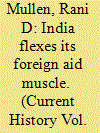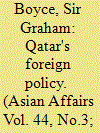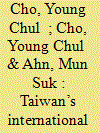| Srl | Item |
| 1 |
ID:
111785


|
|
|
|
|
| Publication |
2012.
|
| Summary/Abstract |
Seeking global recognition, as well as access to resources and markets, one of the world's largest recipients of foreign assistance is boosting the aid that it distributes.
|
|
|
|
|
|
|
|
|
|
|
|
|
|
|
|
| 2 |
ID:
127502


|
|
|
|
|
| Publication |
2013.
|
| Summary/Abstract |
Qatar has only recently emerged as a player in the foreign policy arena. The first sign of what has become a highly distinctive role was the establishment of Al Jazeera, which has changed for ever the way that news media are seen across the Arab world. Qatar then successfully mediated in several conflicts in the region, before playing an active role in the aftermath of the Arab Spring and taking a lead on Libya. Syria poses more of a problem. But Qatar, as a small, rich country in an unpredictable region, now enjoys a high level of global recognition as an independent state.
|
|
|
|
|
|
|
|
|
|
|
|
|
|
|
|
| 3 |
ID:
152499


|
|
|
|
|
| Summary/Abstract |
This paper provides a critical check to the ongoing, dominant blue/green debate about Taiwan’s identity vis-à-vis China. The colour blue is associated with those who support closer ties with China and green with those who support Taiwanese independence. The state-centric debate over unification, independence, or the status quo in cross-strait relations is closely tied to Taiwan’s national aspirations to enhance its international standing in the twenty-first century, a standing which is arguably diplomatically under-recognized. Based on a critical discussion of the blue/green debate, this paper presents two pragmatic ways of augmenting Taiwan’s international visibility through global recognition without jeopardizing national security or regional stability in East Asia.
|
|
|
|
|
|
|
|
|
|
|
|
|
|
|
|